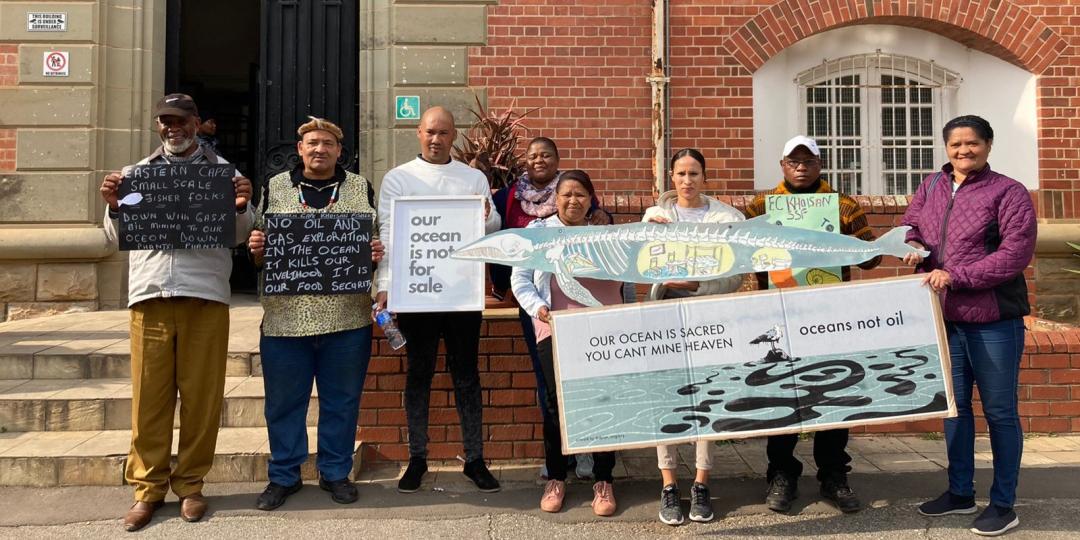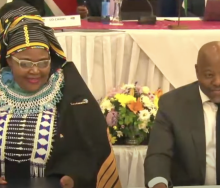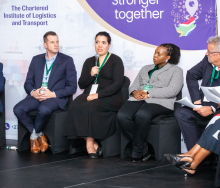Environmentalists celebrated victory against Shell in the Makhanda High Court on Thursday after it set aside the government’s decision to grant the petroleum giant an exploration right to conduct seismic blasting off the Wild Coast of South Africa.
The court ruled that the decision to grant the exploration right was set aside, as well as the decision to grant the renewal of this right. The decision to grant a further, second renewal, was also set aside.
In December 2021, local communities and environmental justice organisations took Shell to court, first to request an urgent interim interdict to stop the seismic testing the company had started in the Wild Coast, a few weeks earlier. Then, in May, the applicants went back to court to ask it to review and set aside a 2014 decision by the Department of Mineral Resources and Energy (DMRE) to grant an exploration right to Shell and Impact Africa to conduct seismic surveys off the ecologically sensitive Wild Coast.
Liziwe McDaid, strategic lead for The Green Connection, one of the environmentalist applicants that took Shell to court, said that citizens had, with the help of the court, “shown that the Constitution and what it stands for will always win over decisions that are not in the public interest”.
“This victory is also a great message to the rest of Africa for African Climate Week, since our continent is experiencing an onslaught of offshore oil and gas proposals, which will have detrimental future impacts. And, if South Africa is serious about climate change, then we must halt all offshore oil and gas exploration, immediately. We hope that this court victory serves to signal a shift to good governance of our oceans, which is needed in the climate crisis we face,” McDaid said.
Ntsindiso Nongcavu, a representative of Coastal Links Port St Johns, said the ruling meant that fishermen’s lives could carry on as normal.
“Our livelihoods depend on fishing. We are happy that our plans have been fulfilled and our livelihoods have been secured, not just for us but for future generations. This outcome motivates us because our government pays no mind to its people, but instead seems to want to make foreign companies richer,” Nongcavu said.
“This is why we, as small-scale fishers, oppose oil and gas. If the onslaught of offshore oil and gas continues, then future generations will have no interest in the sea as a means of life. We are glad that Shell did not win this case because it would mean that thousands of fishers will not be able to use the ocean as before, because it will be zoned off and turned into a no-go area. People will have to be evicted to make space for these operations. That would mean that people's rights will be taken away from them,” he said.
Amadiba Crisis Committee spokesperson Xolobeni Nonhle Mbuthuma said locals were happy with the ruling.
“This means that the planet wins because it has been saved. If the judgement had been in favour of Shell, then that means that the whole planet loses everything, because this case is not just about livelihoods. It is about saving the planet and humanity,” Nonhle said.
Sustaining the Wild Coast representative Sinegugu Zukulu said that unlike other coastal regions in SA, indigenous communities had maintained continuous possession of the land, despite colonial and apartheid dispossession.
“This is no accident. Our ancestors' blood was spilt protecting our land and sea. We now feel a sense of duty to protect our land and sea for future generations, as well as for the benefit of the planet,” Zukulu said.
In its application Shell had relied on an old Environmental Management Programme (EMPr) from 2013. However, it did not consult with many affected communities.
The Green Connection’s community outreach coordinator, Neville van Rooy, added that Shell was the 12th biggest emitter of carbon dioxide globally.
“Shell was recently ordered in the Dutch courts to ‘slash its greenhouse gas emissions by 45% by 2030 compared with 2019 levels’. We are happy that the courts refused to allow the company to continue. How can government not see that in this climate emergency, oil and gas will be a game-changer of the worst kind? The continued pursuit of an economy which includes new fossil fuels is blocking our opportunities that should come from the just transition,” Van Rooy said.














